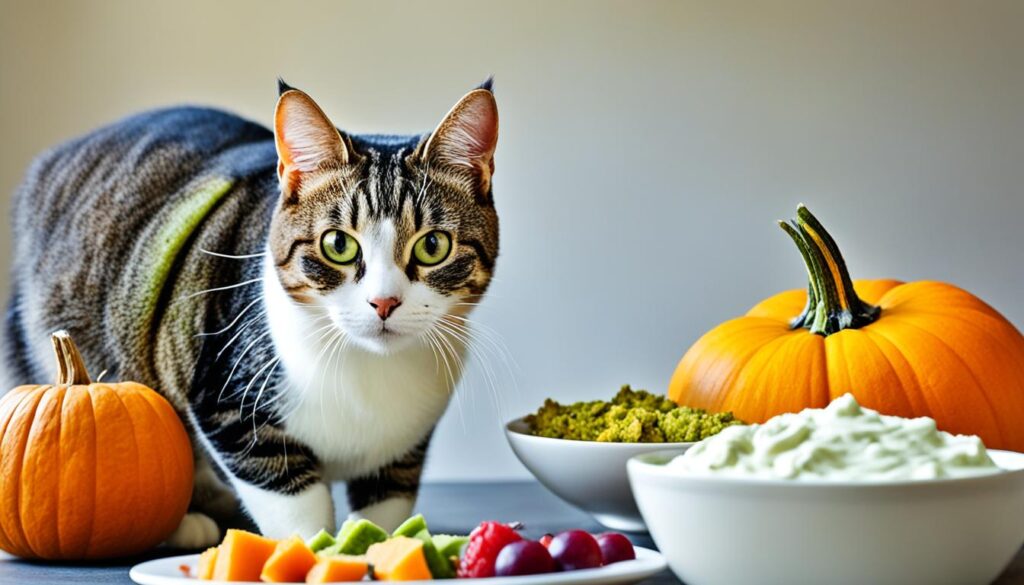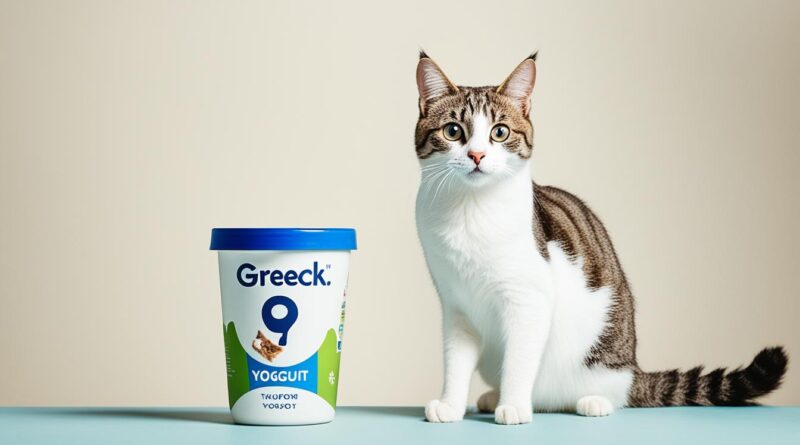Is Greek Yogurt Safe for Cats? Essential Guide.
When it comes to our furry friends, their health and well-being are of utmost importance. As cat owners, we often find ourselves wondering what foods are safe and suitable for our feline companions. One popular food that may come to mind is Greek yogurt. But can cats eat Greek yogurt? Let’s dive into the topic and explore the ins and outs of including Greek yogurt in their diet.
Greek yogurt can indeed be safe for cats, but there are a few key points to consider. Firstly, it is crucial to opt for plain and unsweetened Greek yogurt. Flavored yogurts should be avoided altogether. While we may enjoy the flavors, they often contain added sugars that are not suitable for our feline friends. For example, flavored blueberry yogurt should not be given to cats due to the added sugar. The same goes for strawberry yogurt, which contains natural sugars that are not recommended for cats.
However, plain Greek yogurt in small amounts can be a safe addition to a cat’s diet. Cats can benefit from the protein and calcium content in Greek yogurt, which can support muscle growth and provide essential nutrients. Additionally, Greek yogurt contains beneficial probiotics that can promote healthy digestion in cats. But it’s important to remember that moderation is key—Greek yogurt should not be a regular part of a cat’s diet due to their lactose intolerance.
One important point to note is that vanilla yogurt should be strictly avoided. It often contains ethanol, a substance that can be toxic to cats. Similarly, frozen yogurt is not recommended for cats as it tends to be high in sugar. On the other hand, blackberry, raspberry, and cherry yogurt can be given to cats if fresh berries are added to plain Greek yogurt, ensuring the added fruit is safe for feline consumption.
Key Takeaways:
- Cats can safely consume plain and unsweetened Greek yogurt in small amounts.
- Flavored yogurts, such as blueberry and strawberry, should be avoided due to added sugars.
- Vanilla yogurt and frozen yogurt should not be given to cats.
- Plain Greek yogurt can provide cats with protein, calcium, and beneficial probiotics.
- It is crucial to consult with a veterinarian before introducing Greek yogurt or any new food into a cat’s diet.
Can Cats Digest Greek Yogurt?
Cats have the ability to digest plain Greek yogurt, but moderation is key when offering it to them. Greek yogurt can provide several benefits to feline nutrition, including a good source of protein and calcium. The protein in Greek yogurt aids in muscle growth and repair, while calcium is essential for bone health.
One of the impressive aspects of Greek yogurt is the presence of beneficial probiotics. These healthy bacteria promote better digestion and help maintain a healthy gut flora in cats.
However, it’s important to note that cats are lactose intolerant. Greek yogurt, although lower in lactose compared to regular yogurt, can still cause stomach issues if consumed in large amounts. Therefore, it should not be a regular part of their diet.
Feeding cats excessive amounts of Greek yogurt can lead to weight gain and obesity, as it contains calories that may be surplus to their dietary needs. As responsible pet owners, it’s crucial to provide a well-balanced diet that meets all of their nutritional requirements.

Risks and Considerations of Feeding Cats Greek Yogurt
Feeding cats Greek yogurt can have potential risks and considerations to keep in mind. While there are some potential benefits to cats consuming Greek yogurt, it’s important to understand the potential drawbacks as well.
First and foremost, it’s crucial to recognize that many cats are lactose intolerant, which means they have difficulty digesting dairy products. While Greek yogurt typically contains less lactose than regular yogurt, it can still cause stomach issues in cats and kittens. The lactose present in Greek yogurt can lead to diarrhea, vomiting, and other gastrointestinal problems in lactose-intolerant cats.
In addition to lactose intolerance, Greek yogurt can be high in fat content, which can contribute to weight gain in cats. Obesity is a common health issue among cats, and a diet high in fat can exacerbate this problem. It’s important to monitor your cat’s weight and overall calorie intake when incorporating Greek yogurt into their diet.
Another consideration is the quality and composition of the Greek yogurt itself. Some brands of Greek yogurt may contain added sugars or artificial sweeteners, which can be harmful to cats. These additives can disrupt their natural digestive process and potentially lead to health complications. When selecting Greek yogurt for your cat, opt for plain and unsweetened varieties to avoid any potential risks associated with added sugars or artificial sweeteners.
Consulting with a veterinarian is crucial before introducing Greek yogurt or any new food into your cat or kitten’s diet. They can provide specific guidance based on your cat’s individual needs and health condition. Veterinarians can help determine if Greek yogurt is a suitable option for your cat and recommend the appropriate serving size and frequency.
Overall, while Greek yogurt can offer some nutritional benefits, it’s essential to be aware of the potential risks and considerations. Proper moderation, understanding your cat’s unique dietary needs, and consulting with a veterinarian are vital steps to ensure the health and well-being of your feline companion.
Pros and Cons of Cats Consuming Greek Yogurt:
- Pros:
- Protein and calcium source
- Better digestion with beneficial probiotics
- Cons:
- Potential lactose intolerance
- High fat content
- Possible presence of added sugars or artificial sweeteners
Considering these pros and cons, it is best to consult with a veterinarian to determine if Greek yogurt is suitable for your cat’s individual needs and health status.
Greek Yogurt for Cats
| Pros | Cons |
|---|---|
| Protein and calcium source | Potential lactose intolerance |
| Better digestion with probiotics | High fat content |
| Possible presence of added sugars or artificial sweeteners |
Remember, every cat is different, and their dietary needs may vary. Always prioritize your cat’s well-being and consult with a veterinarian before making any significant changes to their diet.
Alternatives to Greek Yogurt for Cats
While Greek yogurt may not be suitable for cats, there are alternative options that are safe for them. Here are some alternatives to consider:
- Meat-Based Treats: High-quality, protein-rich treats made specifically for cats can provide the necessary nutrients without the potential risks of Greek yogurt. These treats are a delicious and healthy option for cats to enjoy.
- Cat-Specific Probiotics: Probiotics formulated specifically for cats can support digestive health and provide beneficial bacteria to promote a healthy gut. These supplements come in various forms, including capsules or powders that can be sprinkled onto food.
- Cottage Cheese: Cottage cheese is another safe option for cats as it is high in protein and low in lactose. It can be served as a standalone treat or mixed with other foods to add some variety to their diet.
- Kefir: Kefir is a fermented milk product similar to yogurt. It is high in probiotics and low in lactose, making it a beneficial alternative for cats. However, it’s important to choose kefir specifically formulated for cats and introduce it gradually into their diet.
When introducing any new food to a cat’s diet, it is essential to consult with a veterinarian. They can provide personalized recommendations based on your cat’s specific needs and dietary requirements.

Conclusion
In conclusion, while it is safe for cats to eat plain Greek yogurt in small amounts, it should not be a regular part of their diet. Greek yogurt can provide some nutritional benefits to cats, such as protein and calcium. However, it is important to be mindful of the potential risks, especially for lactose-intolerant cats.
Before introducing Greek yogurt to a cat’s diet, it is crucial to choose unsweetened and plain varieties. Consulting with a veterinarian is also recommended to ensure that the cat’s specific dietary needs and health conditions are taken into consideration.
If you’re looking for alternative options, there are other cat-friendly foods that can offer similar nutritional benefits without the potential risks associated with Greek yogurt. Meat-based treats, high-quality protein sources, and cat-specific probiotics are excellent choices to consider. Remember, maintaining a balanced diet and seeking professional guidance are key to ensuring the overall health and well-being of your feline friend.
FAQ
Can cats eat Greek yogurt? Is it safe for them?
Greek yogurt can be safe for cats as long as it is plain and unsweetened. Flavored yogurts should be avoided.
Can cats digest Greek yogurt? What are the benefits?
Cats can digest plain Greek yogurt, and it can provide them with protein and calcium. It can support muscle growth, provide essential nutrients, and promote digestive health because of the beneficial probiotics it contains.
Are there any risks or considerations when feeding cats Greek yogurt?
Yes, cats are lactose intolerant, so Greek yogurt should not be a regular part of their diet. Feeding cats too much Greek yogurt can lead to weight gain and obesity. Additionally, some brands may contain added sugars or artificial sweeteners, which can be harmful to cats.
What are some alternatives to Greek yogurt for cats?
Meat-based treats, cat-specific probiotics, cottage cheese, and kefir can be safe options for cats. These alternatives provide necessary nutrients without the potential risks of Greek yogurt.
In conclusion, can cats eat Greek yogurt?
Cats can eat plain Greek yogurt in small amounts, but it should not be a regular part of their diet. Choosing unsweetened and plain Greek yogurt and consulting with a veterinarian are crucial for their well-being. There are alternative options that can provide similar nutritional benefits without the potential risks of Greek yogurt.


